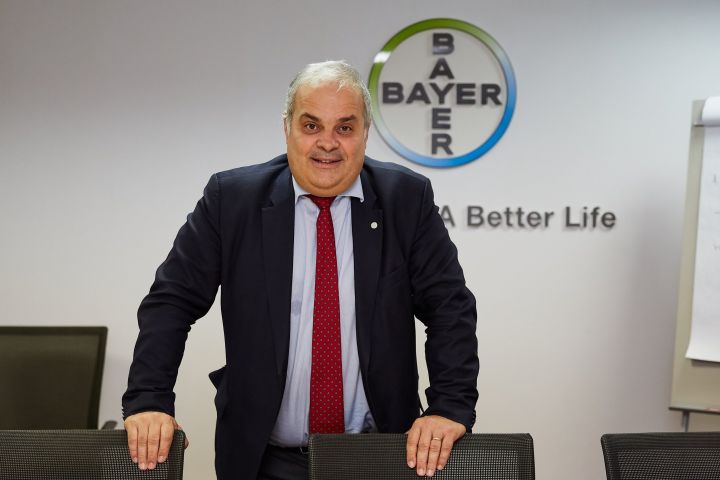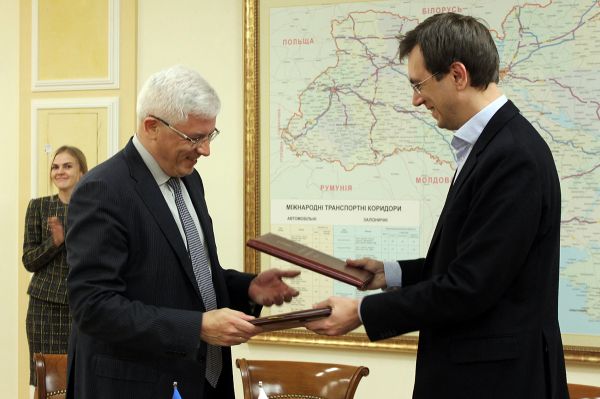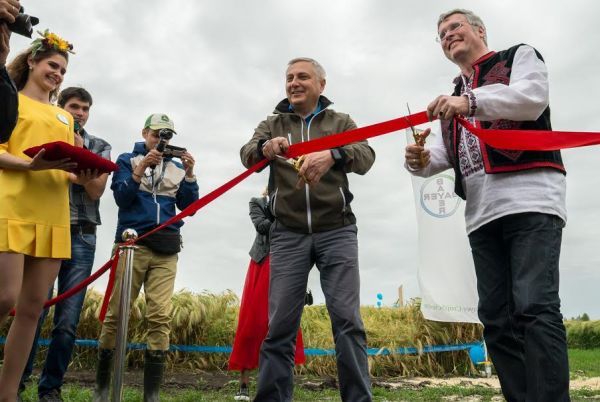Yves Picquet: Working in Ukraine for an Agronomist Is Like Getting to Agri Mecca
Intensification of agricultural industry, enormous desire of the Ukrainian agronomists to study new, fight against counterfeit, and integrated approaches to high-quality change of the Ukrainian agricultural sector. At the end of the year, Latifundist.com spoke about these matters with the Head of CIS & Ukraine at Bayer CropScience Yves Picquet. Besides, we found out what innovations in the market of plant protection products (PPP) and seeds are prepared by the Company, why Ukraine can become one of the three most significant European markets for Bayer, and whether the Company plans new merges.
Latifundist.com: It is your first season in Ukraine as the Head of local division of Bayer. What three main things do you consider the most important in the Ukrainian agribusiness?
Yves Picquet: Ukraine is the agricultural country. For me as an agronomist, it was as a travel to agrarian Mecca. You have a beautiful black soil. The first time when I reached fields near Kiev I asked to stop the car because I wanted to touch this fantastic soil. You cannot even imagine how rich you are in Ukraine. It is exceptional.
From the very beginning I saw many enterprises which develop really quickly. Moreover, they develop in the right direction of sustainable agriculture. They are moving towards intensification in a good sense of this word, thinking of the environment and giving the soil what is necessary for a yield. And of course the level of technologies at the big enterprises is high. I did not expect it.
Latifundist.com: Could you compare the level of development of technologies in Ukraine and in other countries of Eastern or Western Europe?
Yves Picquet: I would say that new technologies in such a country as Ukraine are indeed what is necessary. Here there are large fields, they need to be treated from insects, diseases, etc. in time. Technologies are essential for this, but technologies will never replace people. They will rather help to cope better with field treatment, and to create alarm systems on each field. Data comes from satellites, drones. Yet still checking is necessary, it allows to look after crops correctly. The importance of technologies increases. We speak about sustainable agriculture which has already been implemented everywhere. It will allow to improve the process of soil cultivation in Ukraine, where farmland amounts to hundreds of thousands of hectares. Without technologies, high-quality cultivation is simply impossible. I, however, believe in new technologies in Ukraine more, than in Eastern Europe, where size of the fields is much less, the potential is not so significant.
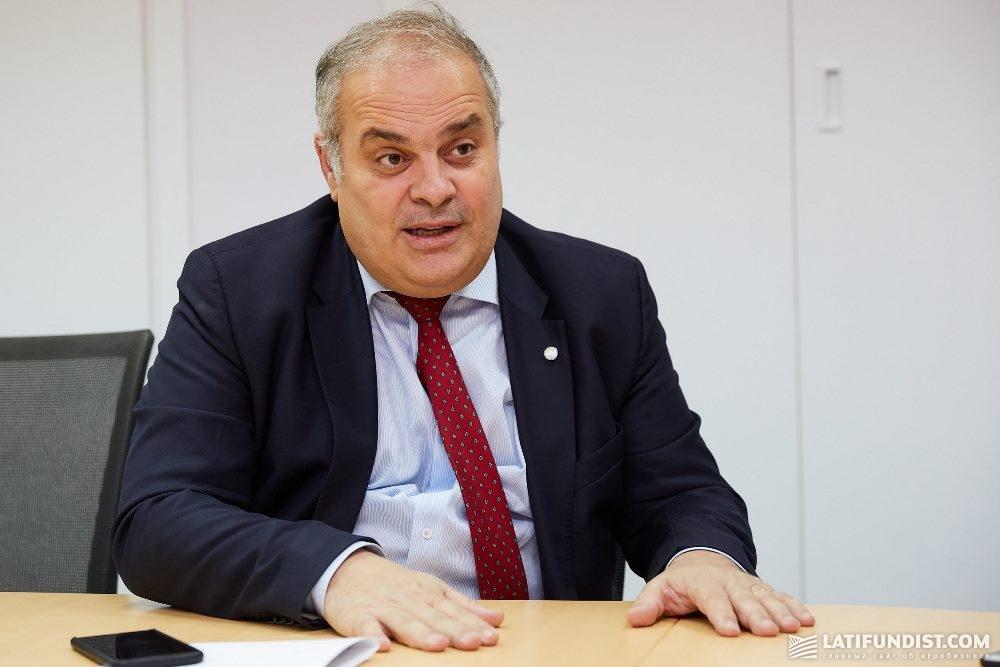
Latifundist.com: Isn’t the intensification level in the European fields as high as in Ukraine?
Yves Picquet: I think that it is even lower. And we do not force Ukrainian farmers to apply more of our products in the fields. Probably, it is strange to hear this from the representative of the company which sells PPP. But each of us knows that the technology with a rough intensification won't make the planet better in any way. I am a proud father of three children, and I want to live on the planet where they and their children could live. People often criticize the industry I work in. As an agronomist and a scientist I know precisely what we bring in the soil and what is actually needed.
Latifundist.com: In Ukraine we have a joke: one can simply stick a spade in the soil, and it will sprout. Is it that easy to produce crops in Ukraine? Could you compare how the production is carried out in Ukraine and in the countries where you happened to work?
Yves Picquet: It is a complex question. If we just look at the soil, then it seems that there is some truth behind this joke. But it is not enough just to plant some seeds. Water is needed, and there might be some problems with it in Ukraine. The climate is continental, weather conditions may change very quickly.
And we have a very important economic part. I know that the state tries to help with it and does more and more for financing agro. Yet access to loans is very important for farmers. Therefore we also make certain efforts in this direction since we often sell products with a delay of payment. Many distributors use such approach. We have different arrangements with banks as well to facilitate access to finance, for example we have a promissory note program for farmers. Yet still access to finance is one of the most critical factors for farming in Ukraine.
The Ukrainian market is not so well organized, as in Western Europe where there is a completely different commercialization of grain and other crops.
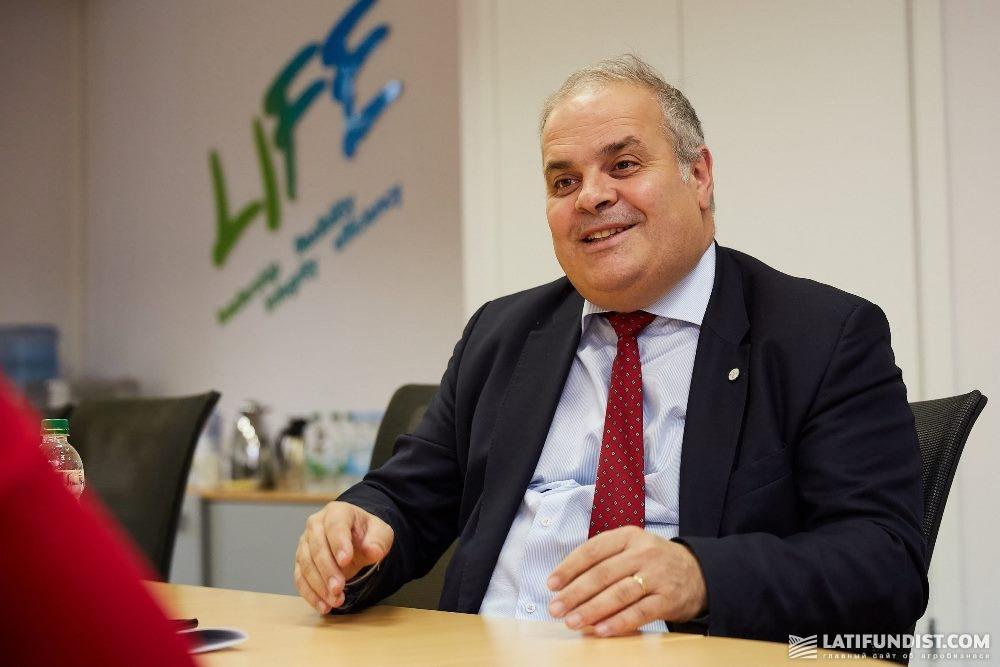
So you cannot ''grow a spade'' in the fantastic soil. When you look at all factors, you realize that to grow good yield it is also necessary to be a good entrepreneur and to control well what you bring into the soil.
Latifundist.com: Let's talk about short-term and long-term plans of the Company in the Ukrainian market. What innovations are you going to offer?
Yves Picquet: We wait for opening of the Seed Centre, where our breeding department will produce and adapt wheat varieties and hybrids. Also a teaching centre will operate at the Seed Centre, where we will demonstrate modern technologies of seed treatment. The opening of Seed Centre is scheduled for spring 2018.
Latifundist.com: And what about the competition in the Ukrainian market in terms of material resources. How intense is it and what share does Bayer hold in the market?
Yves Picquet: We are definitely one of the market leaders. But there is a competition, and it is good. If we have someone to compete with, we always strive to move forward. I would say that is excellent, but only when we speak about fair competition.
Latifundist.com: Do the rules of fair play work in Ukraine?
Yves Picquet: I would say that generally they do. The only problem is a counterfeit. It is illegal and dishonest.
Latifundist.com: How often do you deal with counterfeits of Bayer products in the market?
Yves Picquet: It is difficult to estimate as you speak about the ghost. We speak about the situation when original containers, being made available for counterfeiters, are filled with fake product. There is approximately 15-20% of counterfeit in the Ukrainian market of PPPs but it is impossible to count more accurately. It is important for us that the consumer can identify Bayer products unmistakably. We ensure the proper utilization of used containers in accordance with legal requirements. In my practice I saw completely destroyed yields because people decided to save money and purchased counterfeit.
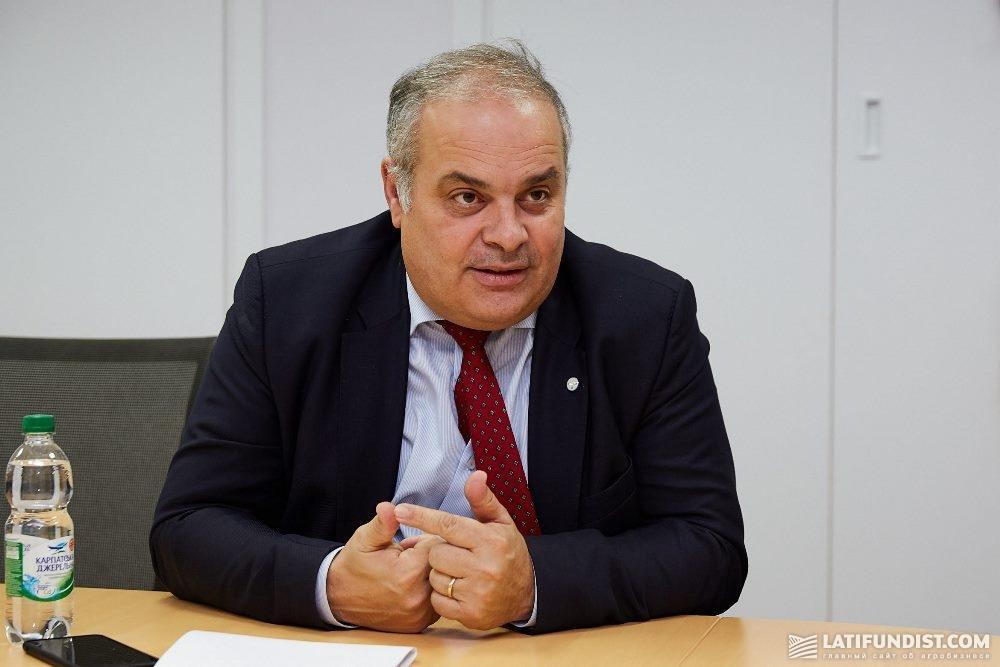
Latifundist.com: Among farmers there is an opinion that Bayer products are quite expensive. Do you agree that only large companies can afford them? Or products are affordable also to medium-sized companies?
Yves Picquet: We have portfolio for either. For example we have fungicide Folicur®, an active and good product at the affordable price. We have products of different levels and one can find whatever he can afford.
When agrarians choose plant protection products, the price may seem a bit high. But it is a wrong approach. The right approach is to treat that as an investment in the future yields. We change the mentality of Ukrainian farmers. It is interesting that it does not work with seeds, which is more emotional product. People invest in it since yields begin with seeds. But if expensive seeds are bought, then they also should be protected well.
Latifundist.com: How do Ukrainian farmers realize this principle?
Yves Picquet: As in any other country. There are those who quickly adapt to new trends, and there are those who do not. But more and more consumers go in the right direction and want to invest in their fields. The trend to intensify this segment has increased.
Latifundist.com: What share of the Company’s global sales does Ukraine hold?
Yves Picquet: It is better to take Europe into account here. Ukraine is in the top five countries. And what is important, we think that with the increasing potential Ukraine can be in the top tree in 10 years.
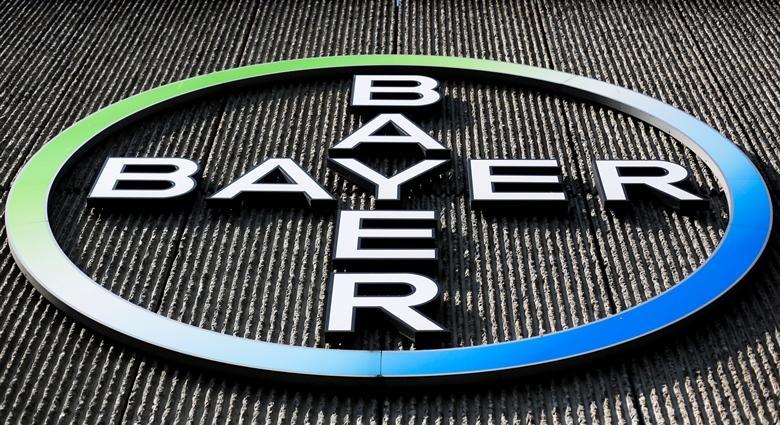
Latifundist.com: Who will be able to exceed Ukraine?
Yves Picquet: Now it is France and Germany. But anyway, I believe that the potential of agricultural industry will slowly grow in Ukraine.
Latifundist.com: How will Bayer-Monsanto merger reflect the local markets?
Yves Picquet: The merger has not been approved yet at the global level, and we are still competitors. But we hope that it will be finalized. Ukraine is one of the countries that approved the transaction and it is good. But we need to receive approval from other countries. Last week, we received good news from the USA: one of two authorities granted approval for the transaction. We hope that by the end of first quarter 2018 the transaction will get a complete approval. It means that by then two teams will begin communicating with each other, so far they do not.
But, frankly speaking, personally I am excited about the merger. Monsanto geneticists create masterpieces, great professionals work in the company. We, for example, do not have such powerful expertise in seeds. We believe we will intensify significantly. This story will help the Ukrainian agricultural sector grow.
Latifundist.com: When will this cooperation begin to bear fruit?
Yves Picquet: The seeds season begins sometime in October, PPPs season starts a bit later. Let's imagine that the transaction is signed by the end of first quarter. It means that we will not begin working earlier than next fall. It is unlikely that the teams will be reorganized in April 2018 to begin a season together. We will run parallel.
Latifundist.com: And what about other merges? Agroholdings are very popular in Ukraine — they have soil, processing, and trading. Would the Company go the same way and carry out a merger with one of machinery manufacturers for example?
Yves Picquet: It is a very unusual question. I have never thought about it. It is definitely not on the agenda now, but let's think about it (laughs).
Latifundist.com: Let's talk about your personal perception of Ukraine. Do you agree that agriculture is some kind of religion and there are features in each country?
Yves Picquet: To be honest, I work in Eastern Europe for about 10 years already. I know a lot about local people, but the Ukrainian mentality is completely unlike the others. People are hospitable, friendly. It was a surprise to me. The Ukrainian mentality is eastern in many respects, and is somewhat similar to the Romanian one. Regardless of various working conditions and different size of enterprises, most of Ukrainian agrarians have similar mentality. Thus it is easier for me to work with farmers.
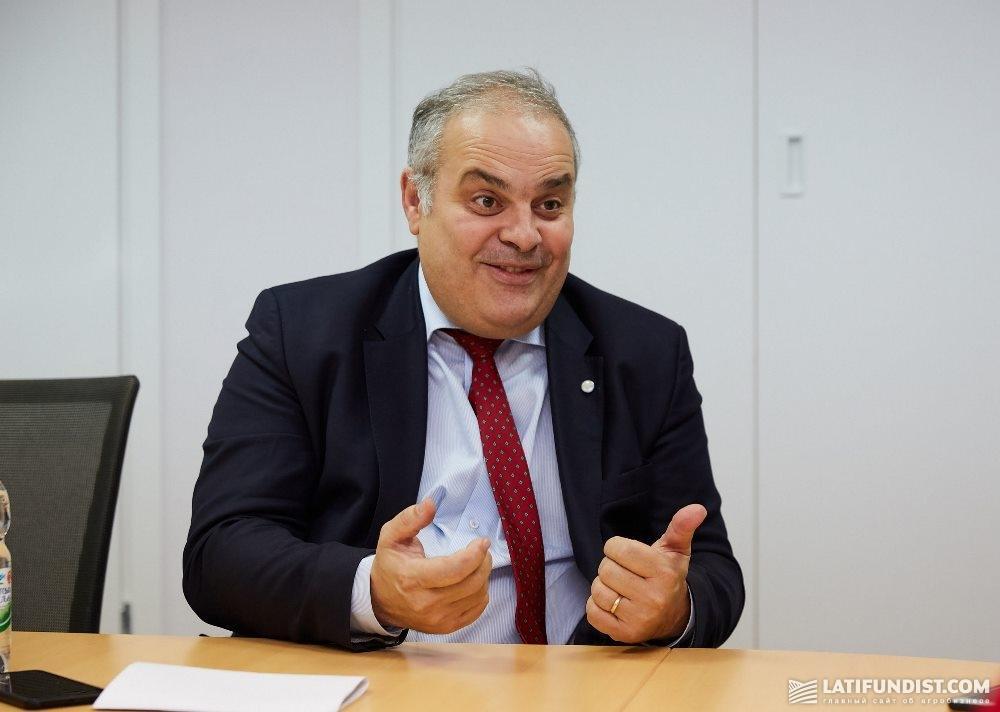
Latifundist.com: When did you start your career in agriculture?
Yves Picquet: I began in the 90th, nearly 30 years ago.
Latifundist.com: And why did you decide to become the agronomist?
Yves Picquet: Frankly speaking, I came to agricultural industry even earlier. It happened in 1979. I am Belgian, and I was born and grew up in the city. My parents bought a country-house near the big farm. I spent the youth earning extra money. Then I decided to become an agronomist. Later I was engaged in distribution and worked in different countries.
Latifundist.com: You are Belgian, you speak English and French perfectly, you work in the German company with a well-known name, and not only in agribusiness. Do you support the Leverkusen Bayer?
Yves Picquet: I am not an avid fan. It is not an obligation for Bayer’s employees (laughs). When I was younger, in Belgium we had a good football team. And then there were transfers of players, and so football disappeared in Belgium. Now I support a national team, they play very well. About 90% of the national team plays in the premier league of Denmark, in Liverpool, Chelsea, and Manchester United. However, I believe that we will be able to become champions in July.
Latifundist.com: How do you spend free time?
Yves Picquet: Last year there was not much of it. But I spend all free time with family and a dog. We try to spend holidays together. My youngest child still studies and seniors work already. But we try to spend 2-3 holidays in a year together.
Latifundist.com: And what inspires you?
Yves Picquet: Communication with people. I get inspiration and energy from them. I enjoy being among people, to motivate and to lead them. When I see this movement, it gives me a powerful recharge. It is indeed very important. I believe that my team can make something really great and unique in the industry.
Latifundist.com: Thank you for the interesting conversation!
Olga Priadko, Latifundist.com

